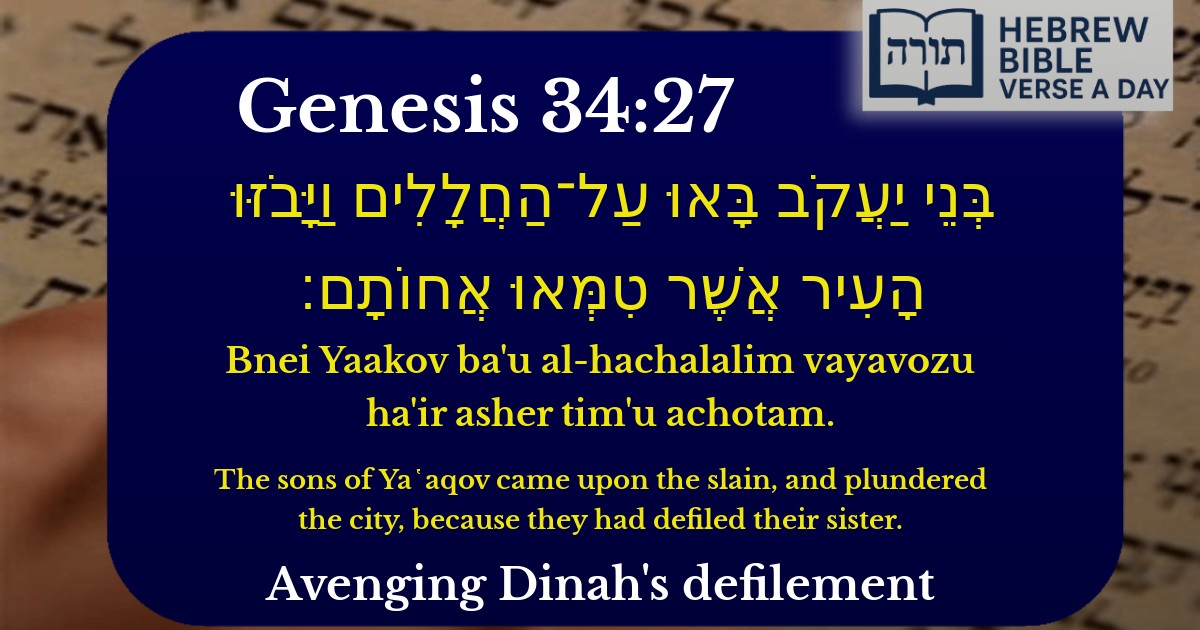Frequently Asked Questions
Q: Why did Jacob's sons plunder the city of Shechem?
A: According to Rashi and the Midrash, Jacob's sons plundered the city of Shechem because its prince, Shechem, had defiled their sister Dinah (Genesis 34:2). The Torah considers this act a grave violation, and her brothers took action to avenge her honor.
Q: Was it justified for Jacob's sons to attack Shechem?
A: The Talmud (Sanhedrin 82a) discusses the moral implications of their actions. While they acted out of zeal for their sister's honor, Jacob later expressed disapproval (Genesis 34:30), fearing repercussions. Jewish commentators debate whether their response was excessive or justified under the circumstances.
Q: What lesson can we learn from this story in Genesis 34?
A: The Rambam (Hilchot De'ot 1:6) teaches that while defending family honor is important, actions must be measured and thoughtful. This episode reminds us to balance righteous anger with wisdom, as impulsive reactions can lead to unintended consequences.
Q: Why does the Torah mention that they 'plundered the city'?
A: Rashi explains that the plundering was part of their punishment against Shechem—not just for the prince's sin, but because the entire city was complicit by failing to protest the injustice (Genesis 34:24). This teaches the Jewish principle of collective responsibility in upholding morality.
Q: How does this story relate to Jewish values today?
A: This episode highlights the Torah's emphasis on human dignity (kevod haberiyot) and the sanctity of family. However, Jewish law (Sanhedrin 72a) also teaches that self-defense must be proportional. It reminds us to stand against wrongdoing while adhering to halachic boundaries.


Context of the Verse
This verse (Bereshit 34:27) describes the aftermath of the incident involving Dinah, the daughter of Yaakov, who was violated by Shechem, the son of Chamor the Chivite. The brothers Shimon and Levi took vengeance by killing all the males of the city, after which the other brothers plundered the city.
Rashi's Commentary
Rashi (Bereshit 34:27) explains that the phrase "בְּנֵי יַעֲקֹב" ("the sons of Yaakov") refers specifically to all of Yaakov's sons, not just Shimon and Levi. He notes that while Shimon and Levi carried out the killing (as mentioned in the previous verse), the other brothers participated in the plundering. Rashi emphasizes that the brothers acted collectively due to the defilement of their sister.
Rambam's Perspective on Justice
Rambam (Hilchot Melachim 9:14) discusses the laws of warfare and ethical conduct, which some commentators apply to this episode. While Rambam does not directly address this verse, his principles suggest that the brothers' actions could be viewed as a form of collective punishment for the city's complicity in Shechem's crime. The city's failure to bring Shechem to justice justified the brothers' response.
Midrashic Interpretations
Moral and Halachic Considerations
The Talmud (Sanhedrin 82a) discusses the zealotry displayed by Shimon and Levi, with some opinions suggesting their actions were justified under the principle of "kana'im pogim bo" (zealots may take action against those who commit public immorality). However, Yaakov's later rebuke (Bereshit 49:5-7) indicates disapproval of their excessive violence, teaching that even righteous anger must be measured.
Conclusion
This verse highlights the tension between justice and restraint. While the brothers acted to avenge Dinah's honor, later Jewish tradition emphasizes the need for proportionality and adherence to halachic standards, even in cases of moral outrage.